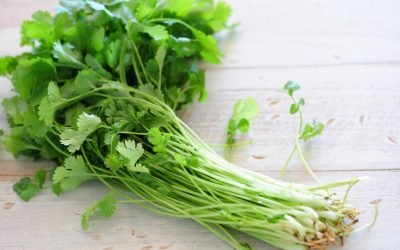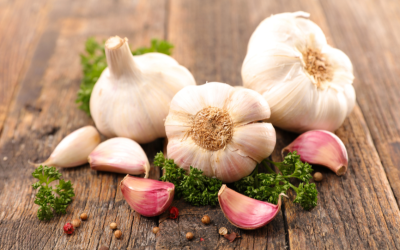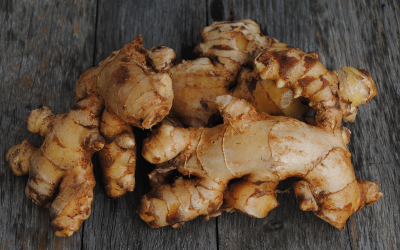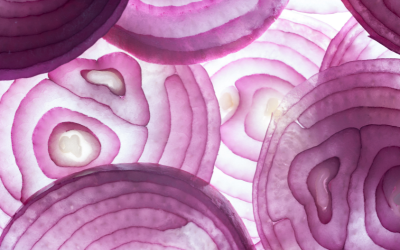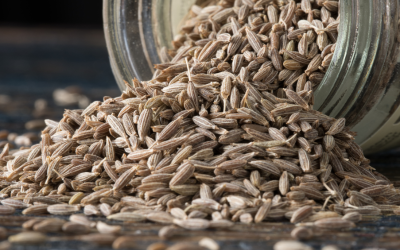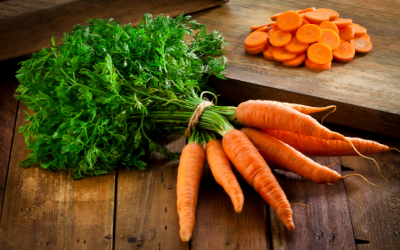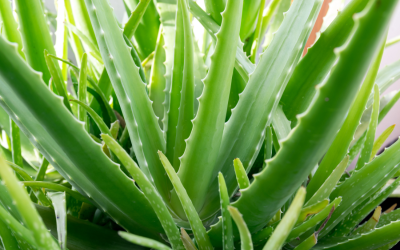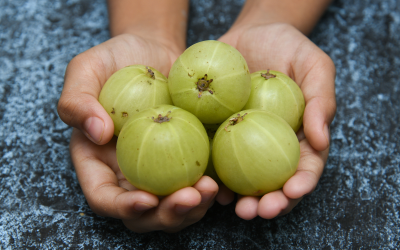Harnessing the Healing Magic of Holy Basil (Tulsi)

Holy basil, also known as Tulsi, holds a special place in traditional medicine for its spiritual and medicinal strengths. Let’s explore its rich history and remarkable healing properties, which have fascinated health enthusiasts for ages. It’s a key player in Ayurveda and various other traditional medicines due to its adaptogenic and healing abilities.
Known as “Tulsi” in India, holy basil is an integral part of Ayurveda, the ancient Indian system of medicine. Its adaptogenic, antibacterial, antiviral, and anti-inflammatory properties have made it a staple in various cultures, including traditional Chinese and Thai medicine.
The leaves are nerve tonic and sharpen memory. They promote the removal of catarrhal matter and phlegm from the bronchial tubes. The leaves strengthen the stomach and induce copious perspiration. The seeds of the plant are mucilaginous or starchy and nourishing. They have a soothing effect on the skin and the mucous membranes. They also increase the volume of urine.
Benefits of Holy Basil
Stress Relief: It contains eugenol and ocimumosides, which lower stress hormones like cortisol, promoting calmness and reducing anxiety. Try tulsi tea or supplements for stress management.
Boosting Immunity: With antibacterial and antiviral properties, holy basil strengthens the immune system. Regular intake, via tea or capsules, may help fend off infections.
Respiratory Support: Its expectorant properties ease respiratory issues. Inhaling steam with holy basil or drinking tulsi-infused concoctions can alleviate coughs and congestion.
Anti-inflammatory & Antioxidant Effects: Holy basil’s compounds like eugenol and rosmarinic acid fight inflammation and oxidative stress, promoting better overall health.
Healing power and methods to use
1) Fevers:
In Malaria and dengue fever, tender leaves boiled with tea, act as a preventive against these diseases. In case of acute fever, a decoction of the leaves boiled with 1 teaspoon of powdered cardamom with half a liter of water and mixed with 1 teaspoon of sugar and milk brings down the temperature.
2) Sore Throat:
Water boiled with basil leaves can be taken as a drink in case of sore throat. This water can also be used as a gargle.
3) Respiratory Disorders:
A decoction of leaves, with honey and ginger is an effective remedy for bronchitis, asthma, influenza, cough, and cold.
A decoction of the leaves, cloves, and 1 teaspoon of common salt also gives immediate relief in case of influenza. They should be boiled in half a liter of water till only half the water is left and then taken.
4) Kidney Stone:
In the case of renal stone, the juice of basil leaves and honey, if taken regularly for six months, will expel them via the urinary tract.
5) Children’s Ailments:
Common pediatric problems like cough, cold, fever, diarrhea and vomiting respond favorably to the juice of basil leaves.
If pustules of chicken pox delay their appearance, basil leaves taken with saffron will hasten them.
6) Eye Disorder:
Basil juice is an effective remedy for sore eyes and night blindness, which is generally caused by vitamin A deficiency. Two drops of black basil juice should be put into the eyes daily at bedtime.
7) Teeth Disorder:
Its leaves, dried in the sun and powdered, can be used for brushing teeth. It can also be mixed with mustard oil to make a paste and used as toothpaste. It is also useful in pyorrhea and other teeth disorders.
8) Ear Disorders:
The juice of the leaves is a well-known remedy for earache and dullness of hearing. A few drops of juice can be put in the ear for treatment.
9) Headaches:
A decoction of the leaves can be given for headaches as well as gout and gonorrhea. Pounded leaves mixed with sandalwood paste can also be applied on the forehead in case of a headache.

Precautions
Consult a healthcare professional before adding holy basil to your routine, especially if you have health issues or take medications.
Holy basil’s traditional uses have stood the test of time and align with modern scientific findings. Its versatility and spiritual importance make it highly valued for overall well-being.
Try incorporating holy basil into your daily routine with teas, supplements, or fresh leaves for a natural boost to wellness.
Remember, like any herbal remedy, understanding and moderation are essential for harnessing holy basil’s incredible health benefits.
When consuming basil leaves, be mindful of potential allergic reactions. Start with small quantities to check for any adverse effects, especially if you have known allergies to other herbs or plants in the mint family. If you’re pregnant, nursing, or have any existing medical conditions, it’s wise to consult a healthcare professional before incorporating basil leaves into your diet or health regimen.
How to make some Tulsi products for home remedies at home:
Tulsi, also known as holy basil, is a versatile herb with numerous health benefits. You can make a variety of home remedies using tulsi for wellness and healing. Here are some recipes you can try:
Tulsi Tea:
- Ingredients: Fresh tulsi leaves (or dried tulsi leaves), water, honey or lemon (optional)
- Instructions:
- Wash and crush a handful of fresh tulsi leaves.
- Bring two cups of water to a boil.
- Add the crushed tulsi leaves to the boiling water and let them simmer for 5-10 minutes.
- Strain the tea and add honey or lemon to taste, if desired.
- Enjoy warm.
Tulsi Tincture:
- Ingredients: Fresh tulsi leaves, vodka or high-proof alcohol
- Instructions:
- Wash and dry a cup of fresh tulsi leaves.
- Place the leaves in a glass jar and cover with vodka or high-proof alcohol.
- Seal the jar and let it sit in a cool, dark place for 4-6 weeks, shaking occasionally.
- Strain the mixture and transfer the tincture to a clean glass bottle.
- Use a few drops of the tincture in water or tea for health benefits.
Tulsi Face Mask:
- Ingredients: Fresh tulsi leaves, honey, yogurt
- Instructions:
- Crush a handful of fresh tulsi leaves into a paste.
- Mix the tulsi paste with one tablespoon of honey and one tablespoon of yogurt.
- Apply the mask to clean, dry skin and leave it on for 15-20 minutes.
- Rinse off with warm water and pat your skin dry.
Tulsi Inhalation:
- Ingredients: Fresh tulsi leaves, water
- Instructions:
- Boil water in a pot.
- Add a handful of fresh tulsi leaves to the boiling water and let it simmer for a few minutes.
- Remove the pot from heat and lean over the pot with a towel covering your head to trap the steam.
- Inhale the steam for 5-10 minutes to clear congestion and soothe your respiratory system.
Tulsi Oil:
- Ingredients: Fresh tulsi leaves, carrier oil (such as coconut or olive oil)
- Instructions:
- Wash and dry a cup of fresh tulsi leaves.
- Place the leaves in a glass jar and cover them with carrier oil.
- Seal the jar and let the mixture sit in a cool, dark place for 4-6 weeks, shaking occasionally.
- Strain the oil and transfer it to a clean glass bottle.
- Use the tulsi-infused oil for massage or as a topical treatment for skin issues.
These recipes allow you to enjoy the health benefits of tulsi in different ways and incorporate them into your daily wellness routine.
References
A Review Paper on Tulsi Plant (Ocimum sanctum L.) (2020) View
H.K.Bakhru (1992) Herbs That Heal: Natural Remedies for Good Health. Orient Paperbacks. Delhi, India.
- T.V.Sairam (1999) Home Remedies Vol-II: A Handbook of Herbal Cures for Common Ailments. Penguin Books India.
Send Us A Message
FAQs
- Tulsi, also known as holy basil, offers numerous health benefits. It can boost the immune system, reduce stress and anxiety, improve respiratory health, and act as an anti-inflammatory and antioxidant. Tulsi is also known for its ability to support heart health and digestion.
- Tulsi can be consumed as a tea made from fresh or dried leaves. It can also be added to smoothies, juices, or used as a culinary herb in cooking. Tulsi supplements, such as capsules or tinctures, are also available for convenience.
- Tulsi is generally safe for most people when consumed in moderate amounts. However, excessive consumption may cause digestive discomfort or interactions with certain medications. Pregnant or breastfeeding women should consult a healthcare professional before using tulsi.
- Yes, tulsi is considered an adaptogen, which means it can help the body adapt to stress and promote a sense of calm. Consuming tulsi tea or supplements can aid in stress management and mental well-being.







